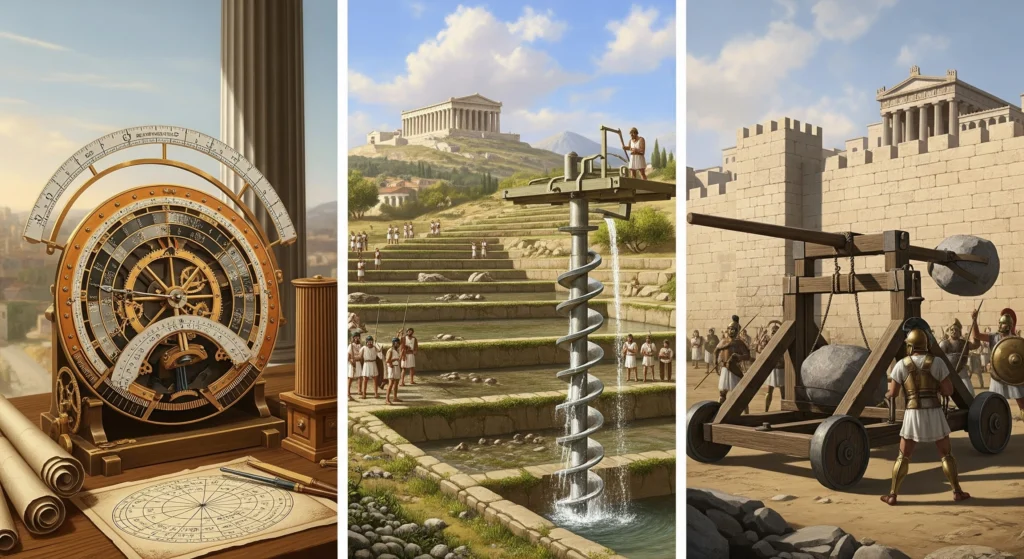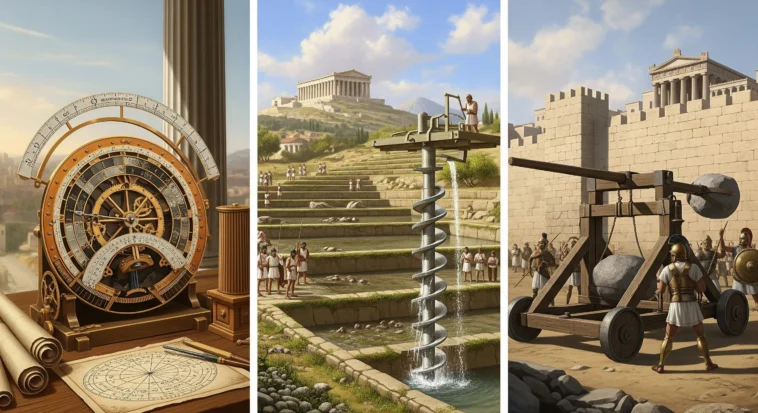
When we hear the term technology innovation, we hear Silicon Valley, artificial intelligence, or the new iPhone.
But here’s the crazy thing — many of the concepts that would revolutionize our current world surfaced more than 2,000 years ago in ancient Greece!
The Greeks were not strictly togas and philosophers — they constructed mechanical machines, practiced science like detectives, and established the foundations upon which we conceptualize technology today.
Their brilliance still directs how we live, learn, and innovate — though we may not even be aware of it.
Revolutionary Mechanical Devices
The Antikythera Mechanism
Picture this—you’re diving in the ocean and spot what looks like a rusty chunk of metal. But surprise! It turns out to be a 2,000-year-old computer.
That’s exactly what happened in 1901 near the Greek island of Antikythera.
This ancient gadget, built around 100 BCE, could predict eclipses, track the Olympics, and map the planets—basically, a cosmic calculator made of bronze gears.
When scientists scanned it with X-rays, they were stunned—it was as complex as a medieval clock, but built over a thousand years earlier.
The Antikythera Mechanism proves the Greeks weren’t just great thinkers—they were incredible engineers way ahead of their time.
The Screw Press and Archimedes’ Screw
And hello here to Archimedes, the world’s finest ancient inventor. He didn’t just yell “Eureka!” in the bath—he constructed machines used today.
His Archimedes Screw was a fairy-tale water pump: rotate a massive screw within a pipe, and water comes up a hill!
Farmers applied it to water fields, and the same system generates modern irrigation and even hydroelectric power—more than 2,000 years later!.
Then came the screw press, used to squeeze olive oil and grape juice—the lifeblood of Greek life.
But its real legacy? It inspired the printing press, the machine that spread knowledge across the world. Not bad for inventions made centuries before electricity!
Architectural and Construction Innovations
Concrete and Advanced Building Techniques
Everyone credits the Romans for concrete, but the Greeks were already ahead of the game.
They weren’t just stacking stones—they were mastering physics.
They figured out weight balance, column design, and even used iron clamps to hold massive marble blocks together—like ancient Lego pieces.
Take the Parthenon. It’s not just a temple—it’s an ancient engineering marvel.
Every line and curve was planned perfectly.
The Greeks even invented three iconic column styles—Doric, Ionic, and Corinthian—each built for both beauty and strength.
These designs became the blueprint for Roman and even modern architecture.
The Crane: Ancient Greece’s Heavy-Lifting Hero
Here’s something neat: more than 2,500 years ago, the Greeks invented the crane.
They used pulleys and winches to hoist enormous blocks of stone up into the air—no motors, no heavy machinery, just intelligence.
That’s how they constructed those temples and theaters that still stand. So next time you see a crane on a construction site, give it some consideration.
We’re really just using a Greek invention, only with a few high-tech tweaks.
Mathematical and Geometric Tools
The Compass and Mathematical Instruments
You probably used a compass in your math class to graph circles—but did you know that ancient Greek mathematicians turned the humble device into a gateway to discovering the universe?
It was not merely a class tool for them—the compass was a symbol of discovery and inquiry.
They applied it in geometry, buildings, astronomy, and even in navigating oceans.
One of the coolest examples comes from Eratosthenes, a Greek genius who lived around 240 BCE.
With nothing more than sticks, shadows, and math, he figured out the circumference of the Earth—and he was shockingly close to the real number!
His trick? He measured the angle of shadows in two cities and used geometry to calculate the planet’s size.
That’s right—over 2,000 years before satellites or GPS, a guy with a compass and brainpower basically proved how big our world really is.
Medical Advancements
Surgical Instruments and Medical Practices
Imagine ancient Greek physicians as the original problem-solvers with scalpels.
Imagine this: a doctor crouched over an injured soldier, rummaging out a bag of leather-padded metal instruments—scalpels, forceps, catheters, even bone drills—and actually making neater work of it.
Archaeologists have found those instruments, and they appear appallingly much like the instruments that surgeons use today.
The Greeks, with men like Hippocrates (the “Father of Medicine”) at the helm, did not see illness as a malicious curse from the gods—they saw it as a problem to be solved.
They engaged in clinical observation, interviewed patients, took detailed notes, and compiled medical texts (the Hippocratic Corpus) that set down early moral guidelines—the basis for the Hippocratic Oath physicians take today.
They even carried out sophisticated procedures in their day—cataract removal, cesarean section, and trepanation—displaying a functional, hands-on understanding of the body.
Innovations in Warfare and Engineering
The Catapult and Military Technology
The ancient Greeks didn’t just fight wars—they engineered them. Around 400 BCE, they invented the catapult, a machine that could hurl massive stones or arrows across long distances.
Some looked like giant crossbows (ballistas), while others used twisted ropes for power (onagers).
These were not only weapons—these were evidence of the Greeks’ profound knowledge of physics and engineering.
Their cunning plans influenced war for centuries and demonstrated how science can be employed for imagination and devastation alike.
The Odometer
Then there was Hero of Alexandria, the ancient world’s mechanical wizard.
Around the 1st century CE, he built the first odometer—a device that measured how far a cart traveled by dropping pebbles into a box with every turn of the wheel.
It was genius! This simple invention helped soldiers plan routes, traders map journeys, and engineers build better roads.
And believe it or not, the odometer in your car still works on the exact same idea Hero came up with over 2,000 years ago.
Everyday Inventions That Shaped Daily Life
The Alarm Clock
Picture yourself a student at Plato’s academy waking up to his ancient alarm clock!
He allegedly used a water clock, or clepsydra, which alerted him with a sound when morning class was due.
The Greeks did not discover water clocks, but they clevered them up—equipping them with smart sound features that basically made them the world’s first alarm clocks.
Subsequently, Ctesibius, a Greek mechanic of approximately 250 BCE, improved these clocks to gauge time accurately.
They were employed to time speeches, church services, and even public performances—testimony that the Greeks actually did pay attention to being on time!
Showers and Plumbing Systems
Think showers are a modern luxury? Nope—the ancient Greeks had them first.
In public baths and gymnasiums, water flowed from overhead pipes so people could rinse off—just like your shower at home.
At places like the Palace of Knossos, archaeologists even found terracotta pipes, aqueducts, and flushing toilets.
Their plumbing was so advanced, some of Europe didn’t catch up until nearly 2,000 years later. The Greeks didn’t just think—they engineered comfort into everyday life.
The Lasting Legacy of Greek Innovation
Ancient Greek inventions aren’t just neat museum pieces—they were experiments in thinking and doing.
From the Antikythera’s gears to Archimedes’ screw and early surgical tools, Greeks mixed careful observation with clever engineering to solve real problems.
Many of their ideas still quietly run our world—either unchanged or evolved.
The big lesson? Theory plus hands-on tinkering beats vague genius every time.
Imagine a Greek engineer sketching a screw in the sand and then watching water climb a tube—that simple moment turned into a tech that still works today.



